As a child specialist with over 15 years of experience, I understand that choosing the right formula milk for their child is a crucial decision for parents. Formula milk is designed to be a safe nutritional alternative to breast milk, especially in cases where the mother is unable to or doesn’t produce enough milk to breastfeed.
Introduction
Although breast milk remains the best source of nutrition for infants, today’s formula milk has been researched and developed to provide all the essential nutrients for a child’s healthy development. According to the NHS, formula milk contains all the necessary vitamins and minerals for a baby during the first 6 months of life.
The Importance of Choosing the Right Formula
Choosing the right formula is crucial for:
- A child’s physical and mental development
- Digestion and nutrient absorption
- Immune system and resistance
- The child’s comfort and happiness
Safety Standards and Regulations
All formula milk products sold on the market must adhere to strict food safety standards and regulations. According to the First Steps Nutrition Trust, manufacturers must:
- Meet national and international standards for ingredients
- Comply with labeling and advertising regulations
- Ensure sterile production processes
- Conduct regular quality checks
Types of Formula Milk
1. First Infant Formula
This is the most basic and common type, suitable for babies from 0-6 months. It is made from cow’s milk protein with a whey:casein ratio of 60:40, similar to breast milk. This type of formula provides complete nutrition for babies and can be used until they are 1 year old.
| Criteria | Powdered Formula | Ready-to-Feed Formula |
|---|---|---|
| Cost | More economical | More expensive |
| Storage | Easy to store, longer shelf life | Shorter shelf life after opening |
| Usage | Requires careful preparation according to instructions | Convenient, easy to use |
| Hygiene | Depends on preparation method | More hygienic as it is sterilized |
3. Organic and Conventional Formula
Organic formula is made from ingredients grown according to organic standards, without the use of pesticides and chemical fertilizers. However, according to the First Steps Nutrition Trust, there is no scientific evidence that organic formula is significantly better than conventional formula.
4. Specialized Formulas
Anti-reflux Formula: For babies who frequently spit up or have reflux
Hypoallergenic Formula: For babies with cow’s milk protein allergy
Lactose-Free Formula: Suitable for babies with lactose intolerance
Comfort Formula: Helps reduce gas and constipation
Important Note: Specialized formulas should only be used under the guidance of a doctor.
5 Best Formula Milk Brands for Babies 0-6 Months
As a pediatric nutritionist with over 10 years of experience, I have researched and thoroughly evaluated the formula milk brands on the market. Below are the top 5 best products, selected based on criteria such as nutrition, safety, and real feedback from thousands of parents.
1. Enfamil NeuroPro – Best Overall Formula
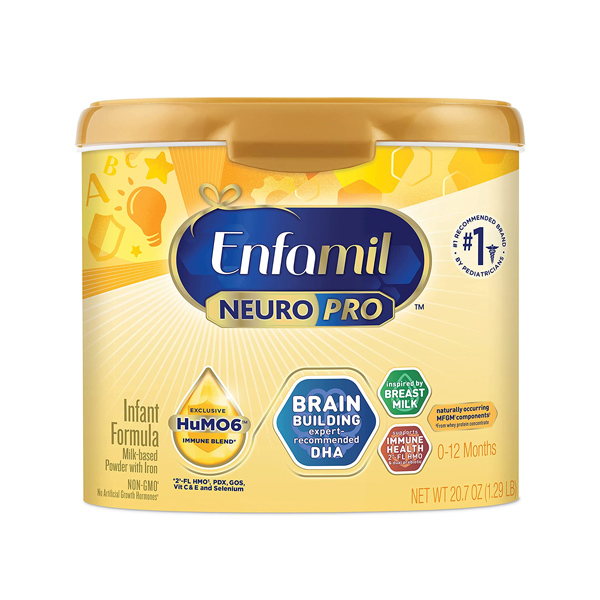
Highlights:
- Contains MFGM and DHA to support brain development
- Easy to digest with high-quality protein formula
- Recommended by many pediatricians
- Available in both powder and ready-to-feed liquid forms
- Reusable and environmentally friendly packaging
“Enfamil NeuroPro is my top choice due to its balanced formula and brain-supporting ingredients optimal for baby’s development.”
2. Bobbie – Premium Organic Formula
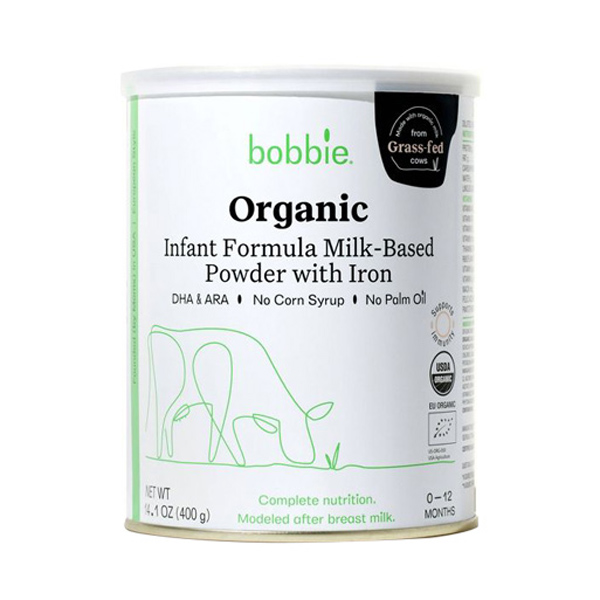
Highlights:
- 100% organic, USDA certified
- Meets FDA and EU standards
- Ingredients sourced from American family farms
- Convenient subscription service
- Non-GMO, pesticide-free
3. Similac Alimentum – Best for Sensitive Babies
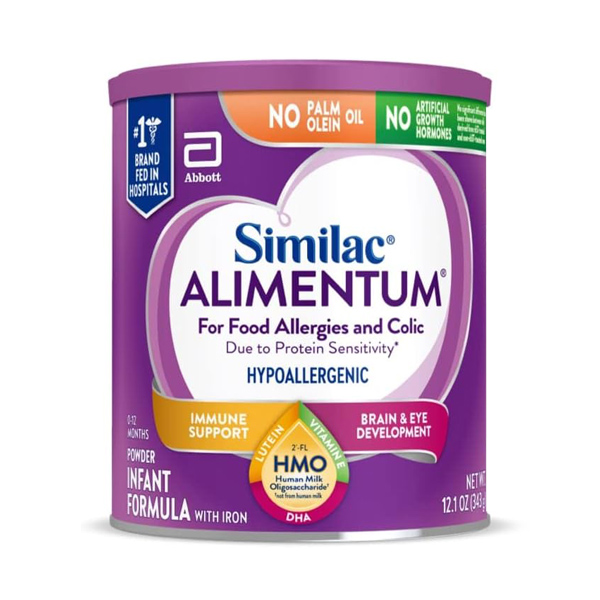
Highlights:
- Hydrolyzed protein for easy digestion
- Significantly reduces allergy symptoms
- Suitable for babies with colic and gas
- Available in powder and liquid forms
4. Earth’s Best Organic – Affordable Organic Formula
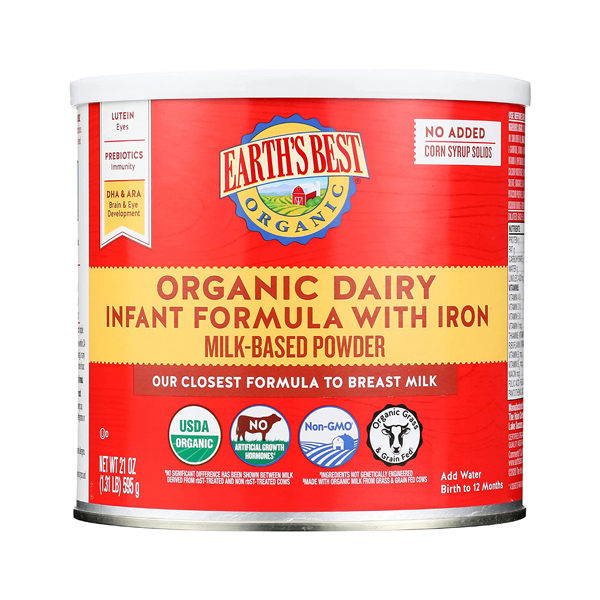
Highlights:
- Certified organic at an affordable price
- No unpleasant odor
- Easy to mix and digest
- Environmentally friendly packaging
5. Kirkland Signature ProCare – Best Budget Formula
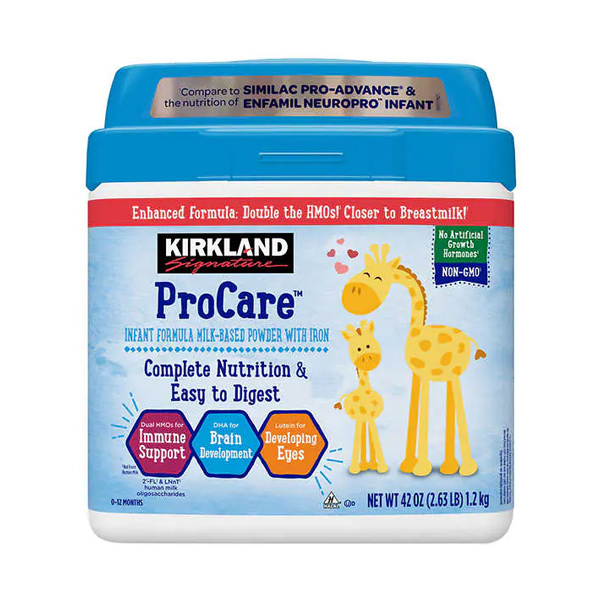
Highlights:
- Comparable quality to premium brands
- Most economical price
- Kosher and Halal certified
- No artificial growth hormones
Important Nutritional Components in Formula Milk
Essential Nutrients and Their Importance
As a pediatric nutritionist, I want to emphasize that formula milk needs to provide all the essential nutrients for a child’s development. According to FDA regulations, all formula milk products must contain 30 essential nutrients. These nutrients play a key role in supporting a baby’s overall development, from the brain to the immune system.
Protein and Types of Protein
Protein is a core component of formula milk, usually extracted from cow’s or goat’s milk. The ideal whey:casein ratio in formula is 60:40, similar to breast milk. Whey is easily digestible protein, while casein provides a longer-lasting feeling of fullness. For sensitive babies, manufacturers offer formulas with partially or fully hydrolyzed protein, making it easier to digest and reducing the risk of allergies.
Vitamins and Minerals
Formula milk is fortified with essential vitamins and minerals. Iron, a key mineral for brain development and blood production, is especially important. Vitamin D is also added in appropriate amounts to support bone development and the immune system. Calcium and phosphorus are balanced to ensure optimal absorption, while zinc supports growth and immune system development.
Beneficial Added Ingredients
Many modern formulas are also supplemented with DHA and ARA – fatty acids important for brain and vision development. Some products also contain prebiotics and probiotics to support a healthy digestive system. However, according to the First Steps Nutrition Trust, aside from DHA, there isn’t strong scientific evidence supporting the benefits of other added ingredients.
How to Choose the Right Formula Milk
Factors to Consider
When choosing formula milk, parents need to consider several factors. First is the baby’s age and health condition. Healthy newborns can use standard formula, while babies with digestive issues may need specialized formulas. It’s also important to consider the origin and reputation of the brand, ensuring the product meets safety and quality standards.
Signs that Your Baby is Tolerating Formula Well
A suitable formula will help your baby grow healthy and happy. The baby will have steady weight gain, be alert and active, and have 6-8 wet diapers per day. Their stool will be light yellow and have a moderate consistency. The baby will not show signs of excessive gas, spitting up, or discomfort after feeding.
When to Change Formula
Changing formula milk should be carefully considered and ideally done with a doctor’s advice. Signs that a formula change may be needed include: frequent spitting up, diarrhea or constipation, rashes or other signs of allergies, excessive crying after feeding, and inadequate weight gain.
Safe Formula Preparation Guidelines
Detailed Formula Preparation Process
Properly preparing formula milk is crucial for ensuring your baby’s safety and nutrition. First, wash your hands thoroughly and sterilize all equipment. Boil water and let it cool to about 70°C (no more than 30 minutes after boiling). Measure the correct amount of water according to the instructions on the formula container. Use the provided scoop to measure the formula powder, do not pack the powder in the scoop. Pour the powder into the water and shake well until completely dissolved.
Storing Formula Milk
Prepared formula should be used within 2 hours if left at room temperature, or within 24 hours if stored in the refrigerator at 4°C. Unprepared powdered formula should be stored in a cool, dry place, away from direct sunlight. Always check the expiration date and ensure the container is tightly closed after each use.
Common mistakes to avoid include: incorrect formula-to-water ratio, using water that is too hot or too cold, not properly sterilizing bottles, and storing prepared formula for too long. These mistakes can affect the nutritional quality and safety of the formula.
Frequently Asked Questions about Formula Milk
Common Concerns about Formula Feeding
In my experience advising thousands of parents, I’ve noticed some frequently asked questions about formula feeding. Firstly, many parents wonder about the amount of formula their baby needs. According to NHS recommendations, newborns typically need about 150ml of formula per kg of body weight per day, divided into 6-8 feedings. However, this is just a guideline, as each baby has different needs.
Another common question is whether it’s necessary to change formula types as the baby grows. In reality, if the baby is thriving on their current formula, there’s no need to change. Stage 1 formula can be used until the baby is 1 year old. Switching to stage 2 formula (follow-on formula) is not necessary according to expert recommendations.
Addressing Common Issues
Constipation is a common problem when formula feeding. This can be due to incorrect formula preparation or the baby needing time to adjust to the new formula. If your baby is constipated, ensure you are mixing the formula correctly and you can gently massage their tummy.
Gas and spitting up are also common issues. To minimize these, burp your baby frequently during and after feeding, avoid shaking the bottle too vigorously when mixing to reduce air bubbles, and maintain the correct feeding position.
When to See a Pediatrician
Parents should take their baby to see a pediatrician if the following signs appear: the baby is not gaining weight or is gaining weight too slowly, shows signs of allergies such as rashes, difficulty breathing, or severe diarrhea, consistently refuses to feed, or shows signs of pain after feeding. Especially, if the baby shows signs of dehydration such as fewer than 6 wet diapers per day, they should be examined immediately.
Conclusion
Choosing and using formula milk correctly plays an important role in a child’s development. All formula milk sold on the market must meet strict nutritional and safety standards. There’s no evidence that more expensive products are better for babies. The most important thing is to choose a formula that suits your baby’s needs and your family’s budget.
Based on my professional experience, I recommend parents start with a basic formula and monitor their baby’s reaction. Only change formulas when truly necessary and ideally with a doctor’s advice. Pay special attention to preparing the formula correctly and maintaining hygiene during the preparation process.
Further Resources
For more detailed information, parents can refer to:
- NHS – Guide to types of formula
- First Steps Nutrition Trust – Information for parents
- American Academy of Pediatrics – Guide to formula feeding
If you have any questions, do not hesitate to contact your pediatrician or a nutritionist for detailed advice tailored to your baby’s specific situation.

